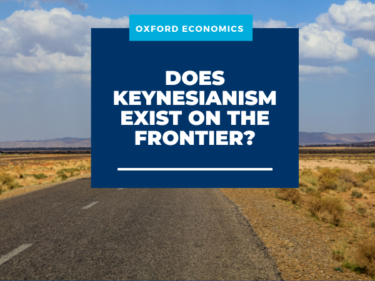Blog | 15 Feb 2021
Does Keynesianism exist on the frontier?

Jacques Nel
Head of Africa Macro,

Economic policy discussions that take place at a global level are more often than not deliberations over the best way forward for advanced economies. The institutional and developmental realities in frontier markets mean that not only do policy objectives differ, but the policy tools available to authorities are in most cases much more limited.
While acknowledging the risk of overgeneralisation, monetary policy in most African countries is qualitatively different from that of advanced economies in both objective and scope. Whereas central banks in advanced economies have consistently missed inflation targets, as highlighted by my colleague Innes McFee in a recent blog post, frontier-market central banks have for the most part been preoccupied with containing inflation. This is difficult in an environment in which structural impediments to the transmission mechanism hinder a quick and complete pass-through of central bank signals to commercial interest rates. Consequently, many African central banks have used exchange rate policies to combat inflation. This has been to the detriment of external liquidity, as seen in countries such as Nigeria, Ethiopia and Angola.
On the flip side, monetary stimulus also takes another form in frontier markets (in those that have monetary sovereignty, that is). While policy rates have dropped to all-time lows in countries from South Africa to Morocco and Rwanda to Côte d’Ivoire during the Covid-19 pandemic, the more effective measures, arguably, have included widening the collateral accepted for central bank lending facilities and reducing liquidity and capital requirements for banks. Interest rate reductions merely reflect intentions.
Then there is the question of credibility. We have argued that this is an era for adventurist rather than conservative economic policy, and that risks to emerging market credibility from expansionary policies have rarely been lower. However, there is again a big difference between an emerging market context (with deep capital markets and a robust domestic financial sector) and frontier markets (without). If even the Bank of England’s credibility is being questioned, what recourse will the central banks of Kenya, Ghana or Mozambique have when the ground starts to shake?
On the fiscal side, there is an inherent contradiction when it comes to credibility in a Keynesian framework: using fiscal stimulus accompanied by a credible fiscal commitment towards deficit reduction. But future use of stimulus will be dependent on what fiscal authorities deem adequate employment or economic growth, meaning consolidation always takes a back seat. This question around credibility is complicated further in the African context, with government efforts to provide basic services already weighing on fiscal finances and pushing public debt higher and higher.
In recognising the central role that fiscal policy will play in the post-Covid recovery, we constructed a Fiscal Space Index to identify where fiscal stimulus could provide significant (and sustainable) support to the economic recovery. As expected, most African governments have almost no room for stimulus when taking into account the nature of spending (recurrent vs capital), steadily deteriorating debt metrics, and the economic devastations wrought by the coronavirus pandemic. In fact, some governments (notably the oil producers) will need to cut spending, thus exacerbating the economic fallout. Many African governments are already in debt distress.
Demand management in the Keynesian context seems somewhat abstract when basic needs remain unsatisfied.
Tags:
You may be interested in

Post
Asia’s cities are reshaping the world
From Seoul to Delhi and Shanghai, Asia’s urban centres are rapidly overtaking global rivals as living standards soar. What will this mean for the balance of global economic power?
Find Out More
Post
The rise of Southern India’s business service hubs
Over the next five years, India is set to be one of the fastest-growing major economies across Asia Pacific, lead by the performance of its IT and business services. The Southern states of Karnataka and Telangana are at the forefront of this success as they are home to two of India’s most rapidly growing cities and productive cities—Bengaluru and Hyderabad.
Find Out More
Post
The Green Leap: More promises but little innovation at COP30
The COP30 in November made some ambitious commitments to scaling up climate finance. Until those materialise, initiatives to leverage natural endowments for financing may be more attractive to African countries, especially those with high forest cover.
Find Out More